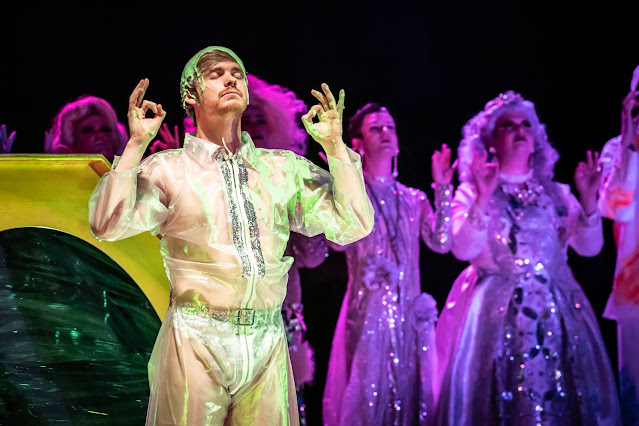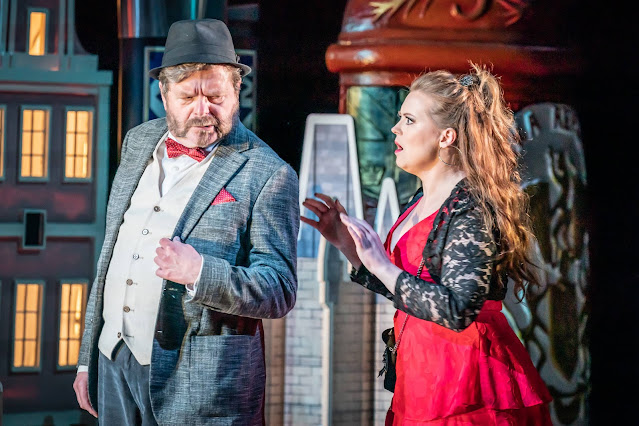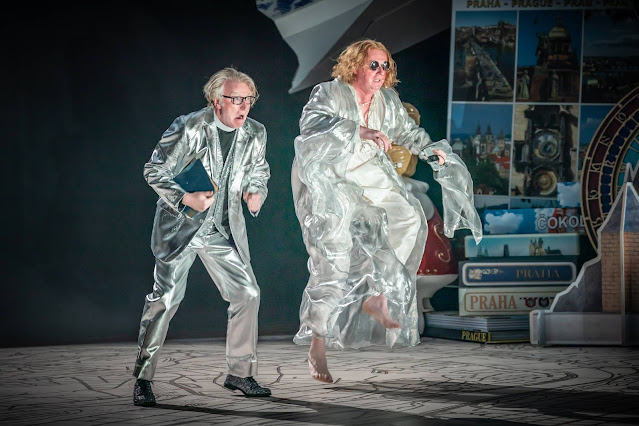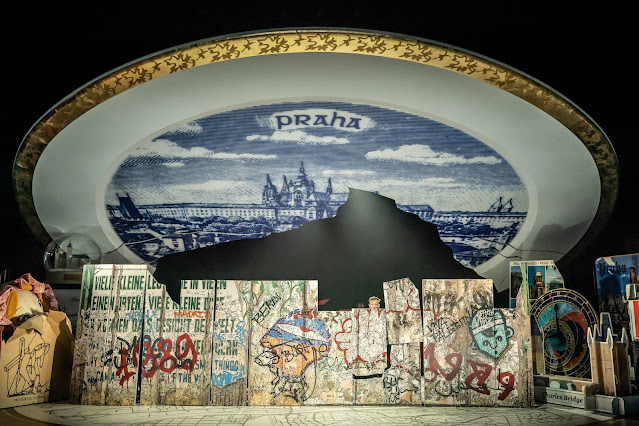 |
| Janacek: The Excursions of Mr. Brouček - Robin Horgan as Spotcek on the Moon - Grange Park Opera (Photo Marc Brenner) |
Considering that it is mature-period Janacek, his opera Výlety páně Broučkovy (The Excursions of Mr. Brouček) is a remarkable rarity. And whilst the work is problematically challenging, this sort of selective view of a composer is typical of the way we can be rather reductive in our view of them, concentrating on a few favoured works. Recent performances in the UK include English National Opera in 1992 and Opera North in 2009, and in concert by Jiří Bělohlávek and the BBC Symphony Orchestra in 2007.
That 1992 performance was directed by David Pountney, and Pountney was again at the helm for Grange Park Opera's enterprising staging of Janacek's The Excursions of Mr. Brouček (seen Saturday 18 June 2022). Conducted by George Jackson with the BBC Concert Orchestra, and with designs by Leslie Travers and Marie-Jeanne Lecca, choreography by Lynne Hockney, lighting by Tim Mitchell, the performance featured Peter Hoare as Brouček, plus Fflur Wyn, Mark Le Brocq, Andrew Shore, and Clive Bayley
Janacek's route to creating opera was neither direct nor straightforward. He wrote Jenufa between 1894 and 1903 (in fact his third opera), it premiered 1904 but Janacek revised it in 1908 and 1915, and the work became popularised in a version not the composer's, ironing out the perceived eccentricities. That he was trying for a different type of opera is seen by his next one, Osud (1903-1905, revised 1906-1907) which has a libretto by one of his students and by Janacek himself. The experimental nature of the libretto meant that the work was never produced in his life time. Next came The Excursions of Mr. Brouček, which Janacek worked on from 1908 to 1917. It's premiere in 1920 was not a great success, and for his next opera Janacek returned to something less experimental, Káťa Kabanová (1920-21), based on an Ostrovsky play. The Cunning Little Vixen (1921-1923) returned to the more experimental manner, short scenes moving into each other and less focus on the 'well-made-play' aspect of Jenufa and Káťa Kabanová, with their focus on their heroines. The Makropoulos Affair (1923-1925) is fascinating, but never quite achieves take-off until the final scene. With From the House of the Dead (1927-1928), Janacek managed to achieve his perfect synthesis, short, filmic scenes, plenty of character but no single overall focus, a miraculous portrait of a community.
 |
| Janacek: The Excursions of Mr. Brouček - Peter Hoare, Fflur Wyn - Grange Park Opera (Photo Marc Brenner) |
The Excursions of Mr. Brouček is based on a pair of popular Czech satirical novels from the 1880s, in which a beer-swilling, sausage-loving everyman experiences mad dreams. In the novels, Mr. Brouček (his name translates as little beetle) is a haughty unlovable character and the reason why Janacek took ten years to write the first excursion (to the moon) was because he and his librettists disagreed about the direction to be taken. Janacek didn't want us to like Mr. Brouček, but at the premiere in Prague, audiences laughed at him.
Both excursions rely quite a bit on the period when they were written. The voyage to the moon satirises modern art fads, though it is not entirely clear who we should sympathise with, the bizarre arty types who live on the moon, or the philistine Mr. Brouček who simply longs for sausage and beer. The excursion to the 15th century is less of a challenge, but even here context is all. For the Czechs, the 15th century Hussite rebellion would have been a key moment in their history and the basics known to everyone and having the opera performed in the new post-war Czech republic would give this contemporary relevance. That Mr. Brouček is assumed to be a German spy because of the Germanic syntax of his Czech would again resonate with an audience whose grandparents would have known the dominance of German culture.
David Pountney and Leslie Travers' solution was to throw ideas at the the work. The staging was full of colour and movement, and definitely high energy. Janacek's short scenes do not allow much in the way of character development, and whereas with The Cunning Little Vixen and From the House of the Dead he achieves cumulative power, in Mr. Brouček the disparate nature of the work (all the main players incarnate three different characters) makes this tricky.
 |
| Janacek: The Excursions of Mr. Brouček - Clive Bayley & Mark Le Brocq on the Moon - Grange Park Opera (Photo Marc Brenner) |
The opening scene in Prague was fun, and we had only just worked out who was whom and what was going on when we were whisked to the Moon. Here everything was mad. Lecca's costumes were dazzling, and Pountney's action was enjoyably madcap. But if you hadn't read the synopsis in detail, then there was no idea what was going on. This was satire pushed to the ultimate Monty Python level and beyond. Certainly when Peter Hoare's Brouček cried 'I just want this to stop' then you rather sympathised with him. If you simply sat back and ignored ideas of plot and satire, then this was a visually inventive performance of a glorious score.
Lacking the necessary historical context, the excursion to the 15th century was similarly problematic. Inventive, yet rather less mad-cap, you were not quite sure who these people were and Pountney's decision to set the victory celebrations in 1989, giving it the understandable context of the post-communist jubilations, fatally injured the dramaturgy so that the final trial scene was curious indeed. Again, it worked if you simply sat back.
What made it all worth while were some brilliant performances of some superb music. From the opening notes of the prelude, we knew we were in secure hands as George Jackson and the BBC Concert Orchestra created Janacek's characteristic gossamer sounds. The sound-world here was not that far from The Cunning Little Vixen and the work can perhaps be best understood in reference to this, the idea of Janacek having another go at making a cartoon dramatisation work. Throughout the work Jackson and his players created mini miracles. The stage action might have been madcap, but the action in the pit was glorious, full of wonderful detail yet paced ideally. This is a performance that really deserves to be listened to.
 |
| Janacek: The Excursions of Mr. Brouček - Fall of the Berlin Wall - Grange Park Opera (Photo Marc Brenner) |
The singers in the main roles were all wonderfully tireless, and each worked hard at creating character and making Janacek's sometimes awkward and less than felicitous vocal writing into something that felt natural and obvious. Fflur Wyn was a complete delight, whether as a flirty bar-maid or a moon maiden in a glitzy costume. Mark Le Brocq managed a highly taxing vocal line and a series of dodgy wigs with complete aplomb, making you feel a pang for each of the rather dodgy characters he played. Andrew Shore moved brilliantly from pub landlord to mad-cap artist to 15th century and back, each time creating real character. Clive Bayley, the sacristan, was a series of wildly vivid characters. But the person who held things together was Peter Hoare, creating in Mr Brouček a sympathetic everyman. He might have been a boor, but Hoare made him loveable and sang Janacek's music in the way it needed. This was a complete tour de force.
Around these were a series of smaller roles, all admirably taken, popping up with vivid character then disappearing, including Anne-Marie Owens, Adrian Thompson, Jonathan Kennedy, Pasquale Orchard, Robin Horgan, Benjie De Rosario, Toki Mano, and Marcus Swietlicki. The chorus too was vividly involved, wearing Marie-Jeanne Lecca's crazily inventive costumes with aplomb and entering into the madcap spirit.
 |
| Janacek: The Excursions of Mr. Brouček - Andrew Shore, Peter Hoare, Clive Bayley in the 15h century- Grange Park Opera (Photo Marc Brenner) |
The work was sung in Pountney's English translation, though there were times when we were glad of the surtitles. The English text was full of contemporary references, implying Pountney had created more of a modern version than a strict translation.
This was a vividly theatrical evening, full of dazzling moments and superb performances of some wonderful music. Quite whether it worked as a staging of Janacek's Výlety páně Broučkovy, I am not sure.
Never miss out on future posts by following us
The blog is free, but I'd be delighted if you were to show your appreciation by buying me a coffee.
Elsewhere on this blog
- A strong affinity to melodic music: I chat to composer John Brunning about his works for guitar - interview
- Strong meat: Grange Park Opera stages Ponchielli's rarity, La Gioconda in a performance that full embraces the work's drama - opera review
- Rising to the challenge: the Young Artists of the National Opera Studio in Sondheim: Before & After - opera review
- Vivid & vibrant: Poul Ruders' Harpsichord Concerto from Mahan Esfahani, Aarhus Symphony Orchestra, Leif Segestam - record review
- Young Artists performance of Tchaikovsky's Eugene Onegin at Opera Holland Park - opera review
- On a highly concentrated scale: Verdi's Macbeth at The Grange Festival - opera review
- Baroque mind games: Handel's Tamerlano at The Grange Festival - opera review
- Violinist Midori Komachi has not only recorded Vaughan Williams' Violin Sonata but is planning performances of the composer's music in Japan - interview
- A romantic woodland walk with Igor Levit and Simon Bode at Wigmore Hall - concert review
- i berzs, i smilgas... (and a birch and grasses...) - Latvian song across the generations from Emils Melngailis & Kristaps Petersons - record review
- Precious Things: a lovely survey of Bernard Hughes' recent choral music from Epiphoni Consort on Delphian - record review
- Hearing with new ears: Italian pianist Pina Napolitano wants her Conway Hall recital Tempo e Tempi to make the music of Carter more familiar and that of Beethoven more unfamiliar - interview
- Returning the work to its Opera Comique roots: an engaging new Carmen from Opera Holland Park that adjusts tradition rather than reinventing it - opera review
- Home

.jpg)









experimental nature of the libretto meant
ReplyDeleteThis comment has been removed by a blog administrator.
ReplyDelete